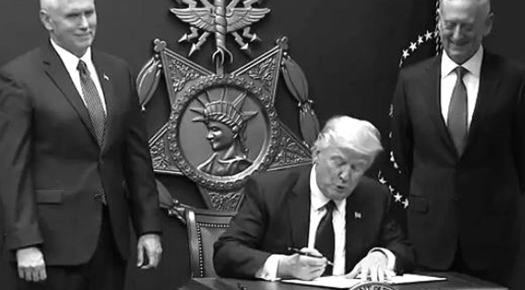
The Freedom From Religion Foundation (FFRF) has decided to legally challenge President Trump over his new executive order about “religious liberty” because the aim of this order is to “usher in a new era of church politicking to the exclusion of secular organizations.”
“Presidential Executive Order Promoting Free Speech and Religious Liberty” was signed on May 4 during a National Day of Prayer ceremony in the Rose Garden before a largely clerical audience. Trump said:
"This executive order directs the IRS not to unfairly target churches and religious organizations for political speech. No one should be censoring sermons or targeting pastors. [Standing ovation.] . . . In America we do not fear people speaking freely from the pulpit, we embrace it.”
According to President Trump, the executive order should stop “the financial threat against the faith community” and he told them: “You’re now in a position where you can say what you want to say.” The FFRF asserts the president has no constitutional authority to selectively veto a legitimate statute that Congress passed and a president signed into law more than 50 years ago.
The part of the law, called Johnson Amendment is a provision in the U.S. tax code that prohibits all 501(c) (3) non-profit organizations from endorsing or opposing political candidates. A 501(c)(3) organization is a corporation, trust, unincorporated association, or other type of organization that is exempt from federal income tax under section 501(c)(3) of Title 26 of the United States Code.
Since 2000, many Republicans, including President Donald Trump, have sought to repeal the provision, arguing that it restricts the free speech rights of churches and other religious groups. In June 2016 Trump even said that overturning the Johnson Amendment will be his greatest contribution to Christianity, and other religions. Repeal has been criticized because churches have fewer reporting requirements than other non-profit organizations, and because it would effectively make political contributions tax-deductible.
The Executive Order reads: “Federal law protects the freedom of Americans and their organizations to exercise religion and participate fully in civic life without undue interference by the Federal Government. The executive branch will honor and enforce those protections … Department of the Treasury shouldn’t take any adverse action (the imposition of any tax or tax penalty; the disallowance of tax deductions for contributions made to entities exempted from taxation under section 501(c) (3) of title 26, United States Code) against any individual, house of worship, or other religious organization on the basis that such individual or organization speaks or has spoken about moral or political issues from a religious perspective…”
According to FFRF Executive Directors Dan Barker and Annie Laurie Gaylor, the executive order effectively provides preferential treatment to churches and will result in obligations on secular nonprofits, including the plaintiffs, that are not imposed on churches. This could amount to more than $100 million annually in tax-free contributions for politicking pastors.
Photo Credits: Wikimedia
